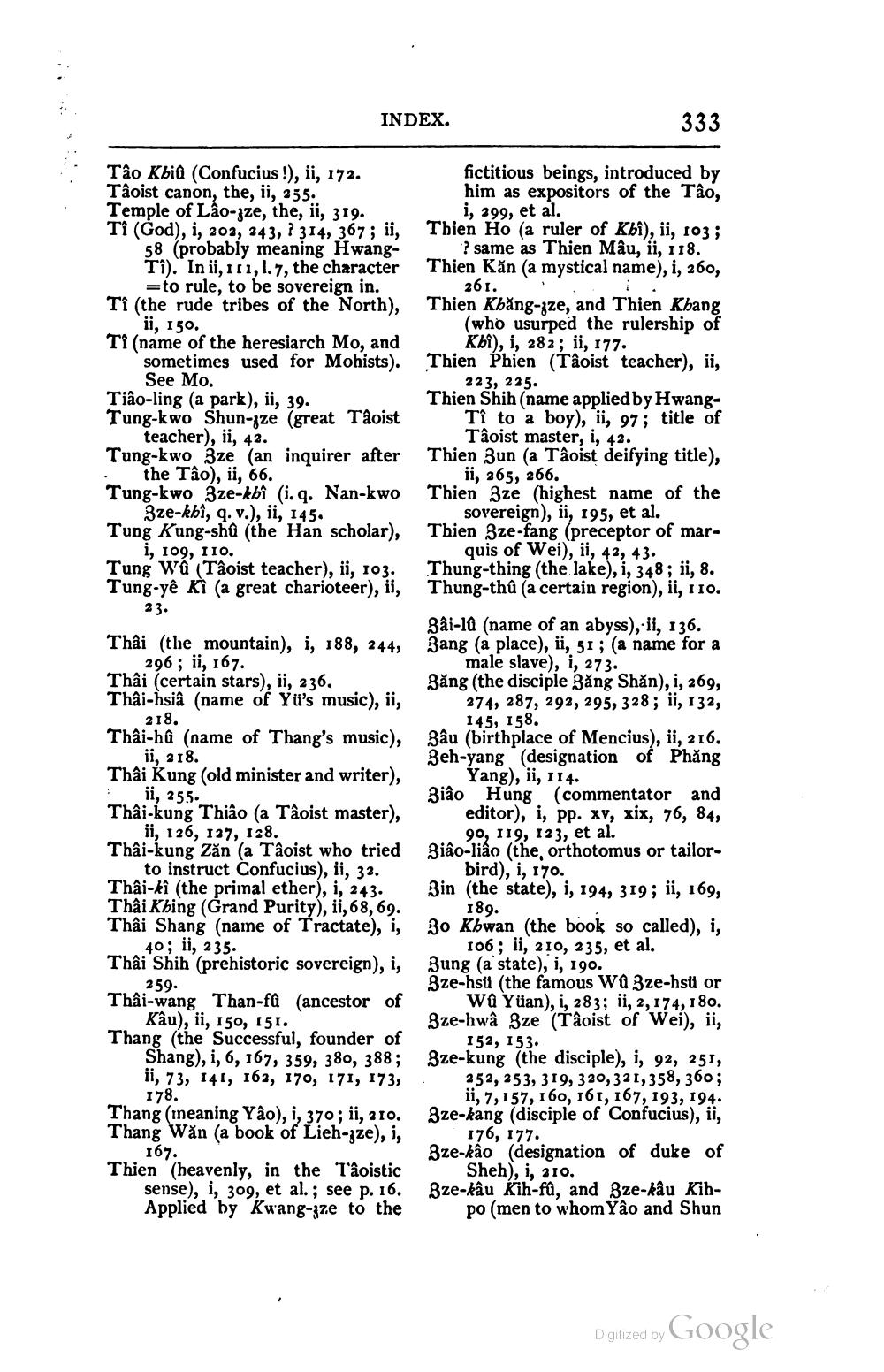________________
INDEX.
333
Ti (nsometimes , 39.
Tâo Kbia (Confucius !), ii, 172.
fictitious beings, introduced by Taoist canon, the, ii, 255.
him as expositors of the Tâo, Temple of Lào-jze, the, ii, 319.
i, 299, et al. Ti (God), i, 202, 243,7 314, 367; ii, Tbien Ho (a ruler of Kbi), ii, 103; 58 (probably meaning Hwang-
? same as Thien Mâu, ii, 118. Tî). In ii, 111, 1.7, the character Thien Kån (a mystical name), i, 260, =to rule, to be sovereign in.
261. Ti (the rude tribes of the North), Thien Kbăng-sze, and Thien Khang ii, 150.
(who usurped the rulership of Ti (name of the heresiarch Mo, and Kbî), i, 282; ii, 177.
sometimes used for Mohists). Thien Phien (Taoist teacher), ii, See Mo.
223, 225. Tiâo-ling (a park), ii, 39.
Thien Shih (name applied by HwangTung-kwo Shun-zze (great Tâoist Ti to a boy), ii, 97; title of teacher), ii, 42.
Taoist master, i, 42. Tung-kwo Zze (an inquirer after Thien Sun (a Tâoist deifying title), · the Tao), ii, 66.
ii, 265, 266. Tung-kwo ¿ze-kbî (i.q. Nan-kwo Thien Sze (highest name of the 3ze-kbi, q.v.), ii, 145.
sovereign), ii, 195, et al. Tung Kung-shu (the Han scholar), Thien Sze-fang (preceptor of mari, 109, 110.
quis of Wei), ii, 42, 43. Tung wū (Taoist teacher), ii, 103. Thung-thing (the lake), i, 348; ii, 8. Tung-yê Ki (a great charioteer), ii, Thung-thù (a certain region), ii, 110. 23.
Sâi-IG (name of an abyss),- ii, 136. Thâi (the mountain), i, 188, 244, Zang (a place), ii, 51; (a name for a 296; ii, 167.
male slave), i, 273. Thâi (certain stars), ii, 236. | Băng (the disciple Băng Shăn), i, 269, Thâi-hsiâ (name of Yü's music), ii, 274, 287, 292, 295, 328; ii, 132,
145, 158. Thâi-hû (name of Thang's music), 3âu (birthplace of Mencius), ii, 216. ii, 218.
Zeh-yang (designation of Phăng Thâi Kung (old minister and writer), Yang), ii, 114. ii, 255.
Zião Hung (commentator and Thâi-kung Thiâo (a Taoist master), editor), i, pp. xv, xix, 76, 84, ii, 126, 127, 128.
90, 119, 123, et al. Thâi-kung Zăn (a Tâoist who tried Ziâo-liko (the, orthotomus or tailorto instruct Confucius), ii, 32.
bird), i, 170. Thai-ki (the primal ether), i, 243. Zin (the state), i, 194, 319; ii, 169, Thâi Kbing (Grand Purity), ii, 68, 69. 189. Thâi Shang (name of Tractate), i, 30 Kbwan (the book so called), i, 40; ii, 235...
106; ii, 210, 235, et al. Thâi Shih (prehistoric sovereign), i, Zung (a state), i, 190. 259.
Sze-hsü (the famous Wa Zze-hsü or Thâi-wang Than-fd (ancestor of Wa Yuan), i, 283; ii, 2, 174, 180. Kâu), ii, Iso, I5I.
Sze-hwâ 3ze (Taoist of Wei), ii, Thang (the Successful, founder of 152, 153.
Shang), i, 6, 167, 359, 380, 388; Sze-kung (the disciple), i, 92, 251, ii, 73, 141, 162, 170, 171, 173, 252, 253, 319, 320, 321,358, 360 ; 178.
ii, 7, 157, 160, 161, 167, 193, 194. Thang (ineaning Yâo), i, 370; ii, 210. Sze-kang (disciple of Confucius), ii, Thang Wăn (a book of Lieh-jze), i, 176, 177. 167.
Sze-kấo' (designation of duke of Thien (heavenly, in the Taoistic Sheh), i, 210.
sense), i, 309, et al.; see p. 16. 3ze-kâu Kih-fû, and 3ze-kâu KihApplied by Kwang-zze to the po (men to whom Yâo and Shun
218.
Digitized by Google




